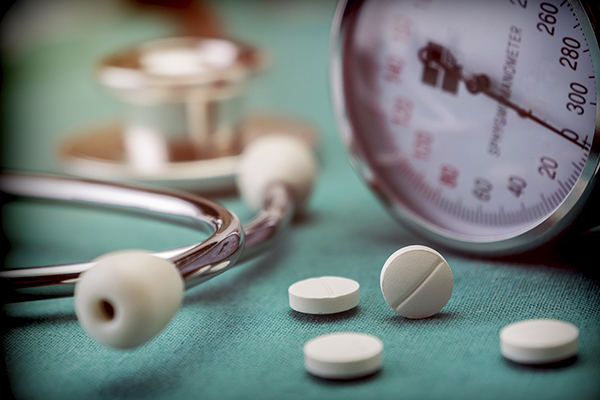




If you’ve been told of recent high blood pressure, you are likely concerned about its impact on your health. Most often, high blood pressure is due to weight gain, stress, and a poor lifestyle. Losing five to seven percent of your weight and incorporating some cardio, strength, and isometric exercise into your lifestyle can have huge benefits.
But if you’ve done all that, and your blood pressure readings are still in the abnormal range, the first place to look is your medicine cabinet. Many over-the-counter (OTC) medications have a side effect of driving up blood pressure. NSAIDs (nonsteroidal anti-inflammatory drugs) are a common culprit: Ibuprofen (Advil, Motrin) and naproxen (Aleve) can have this effect if taken regularly. In addition, medicines for coughs, colds, and flu as well as decongestants are also found to raise blood pressure.
Antacids that are high in sodium, weight-loss stimulants (eek! do folks still use those?), and caffeine pills all contribute to high blood pressure. I’ve written before about caffeine’s effect on blood pressure in susceptible individuals.
Prescription medications are a common culprit of high blood pressure side effects too. Antidepressants such as Prozac, tricyclic antidepressants, and monoamine oxidase inhibitors, because they’re used long-term, can cause or exacerbate hypertension.
Certain steroid medications used to treat autoimmune conditions like lupus and rheumatoid arthritis, as well as gout medications, may adversely impact blood pressure. Immunosuppressant drugs used in cancer and autoimmune diseases are also on the list of having blood pressure-related side effects.
Central nervous system stimulant medications used to treat such conditions as fatigue, narcolepsy, ADHD, and intractable weight loss can most definitely drive up blood pressure, as any stimulant has the potential to do.
If you are concerned about your medications and think they may be the cause of your high blood pressure, best to speak with your doctor about other options. And never attempt to taper or stop prescription medications on your own.
To your health!
Though we think of declining estrogen as the hallmark of menopause, it's actually common for…

Up to 12 percent of Americans have ulcers at some point in life. Peptic ulcers…
Gallbladder disease is a modern illness. An estimated 20 million Americans have gallbladder disease. The…

There’s more to GI health than whether or not to take an acid-blocker. All too…

In the latest attempt to remove “stigma” from medical terminology, liver specialists have come up…

Q: My husband’s high sensitivity C-reactive protein (hs-CRP) is 1.62 and his homocysteine is 13.1. If…

Banish the Bloat: Leyla Weighs In with Tips and Insights

Our virtual voicemail is open 24/7, so there's no need to wait to submit your questions for Dr. Hoffman. Leave a message, and you may hear your question featured on the Intelligent Medicine radio program!